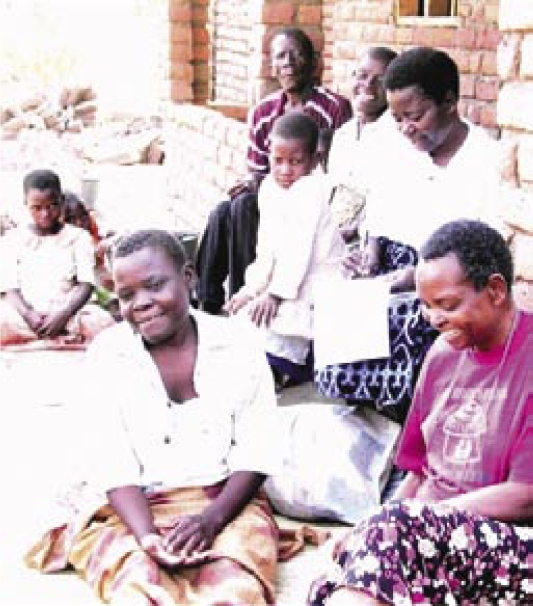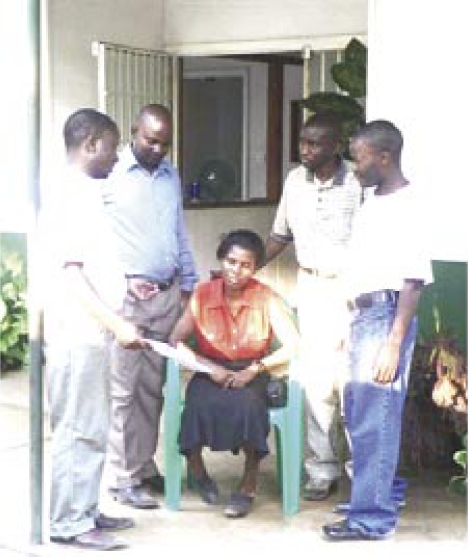On 27th June 2007, Malawi's first dedicated palliative care centre, Ndi Moyo, was officially opened by the Honourable Marjorie Ngaunje, the then Minister of Health. Over 260 patients have registered since August 2006 when they first started to receive treatment for relief of severe and chronic pain which is frequently related to cancer (above 90% are so diagnosed). Most are terminally ill as a result of their cancer, HIV/AIDS and/or other progressive and irreversible conditions. 60% are known to be HIV positive. 40% have died within the 2 year period that the Ndi Moyo Centre has been open, but were helped to live a full life until they died.
The primary diagnoses found in the patients registered at the centre are given in Table 1. It should be noted, however, that Ndi Moyo is not a diagnostic centre for cancers, or HIV or any other medical condition. It provides a dedicated palliative care service that complements the services of other health providers.
Table 1.
Diagnosis of NdiMoyo patients
| Diagnosis | 24 Months Aug '06–Sept '08 Frequency |
|
| No | % | |
| Abdominal Tumour | 1 | 0.38% |
| Ameloblastoma, cancer | 1 | 0.38% |
| Anal cancer | 1 | 0.38% |
| Bacterial meningitis | 1 | 0.38% |
| Bladder cancer | 2 | 0.75% |
| Bone cancer | 2 | 0.75% |
| Breast cancer | 5 | 1.88% |
| Burkitt's lymphoma | 8 | 3.01% |
| Burns | 2 | 0.75% |
| Cervical Cancer | 41 | 15.41% |
| Chronic ulcer | 1 | 0.38% |
| Cryptococcal meningitis | 1 | 0.38% |
| Eye tumour | 2 | 0.75% |
| Fungating ulcer | 1 | 0.38% |
| Gastric cancer | 2 | 0.75% |
| Hepatic tumour | 2 | 0.75% |
| Hepatocellular carcinoma | 2 | 0.75% |
| HIV/AIDS | 10 | 3.76% |
| Kaposi's sarcoma | 131 | 49.25% |
| Liver abscess | 1 | 0.38% |
| Lymphoma | 1 | 0.38% |
| Malignant tumour | 4 | 1.50% |
| Multiple myeloma | 1 | 0.38% |
| Neurocalsym | 1 | 0.38% |
| Oesophageal cancer | 27 | 10.15% |
| Oesteomyelitis | 1 | 0.38% |
| Palate cancer | 1 | 0.38% |
| Pancreatic cancer | 1 | 0.38% |
| Penis cancer | 1 | 0.38% |
| Prostate cancer | 3 | 1.13% |
| Pyomasitis | 1 | 0.38% |
| Skin cancer | 2 | 0.75% |
| Skin ulcer | 1 | 0.38% |
| Splenomegaly | 2 | 0.75% |
| Tuberculosis | 1 | 0.38% |
| Tuberculosis spine | 1 | 0.38% |
| Grand Total | 266 | 100.00% |
It receives patients from many places including KCH (Kamuzu Central Hospital), St Gabriel (Namitete Hospital), Balaka District Hospital, Mua Mission Hospital, St Anne's Mission Hospital, Nkhotakota , Salima District Hospital and Queen Elizabeth's Central Hospital. After diagnosis and discharge from these hospitals, patients often return home without any clear idea of where and how to access appropriate palliative care treatment.
The principle cancers that Ndi Moyo has dealt with are Kaposi's sarcoma (49.3 %), cervical cancers (15.4 %), oesophageal cancers (10.2 %) and Burkitt's lymphoma (3.0 %). At the same time, 59% of its registered patients are known to be HIV positive, 24% negative and 17% are of unknown status. However, it should be noted that HIV is not in itself a defining reason for registration at Ndi Moyo. Only 10 clients with HIV as a primary symptom have been enrolled on its programme, due to pain.
Palliative care across Sub-Saharan Africa is still in its infancy and invariably practised in resource limited settings. Accordingly effective medical treatment has to take account of factors not faced in the rich, more highly developed regions of the world. For example nsima readily blocks a gastrostomy tube and high nutrient liquid foods are difficult to access. Ndi Moyo patients with oesophageal carcinoma usually arrive at such an advanced point that they can barely swallow their own saliva and are immediately initiated on high dose steroids: a short intravenous course of dexamethasone 16mg a day for three days and thereafter orally, reducing by 2mg every other day. In most cases this treatment, with a suitable antifungal, provides sufficient relief for patients to swallow liquids again within 72 hours, and go on to live a more normal life for some time, as indicated by the following results to date.
Of the 24 patients provided with the above treatment 54% have lived 40 or more days, with the longest surviving for 388 days. Without, most would have died from dehydration and starvation within a matter of one or two weeks. Once the bulk of the tumour, or the oedema surrounding it, has been reduced by the dexamethasone the patient can swallow liquids and slowly progress to semi- solids, such as porridge or even soft nsima.
The Ndi Moyo Centre sets out to provide a model of holistic care, which can be replicated in many other parts of Malawi. The services it provides go far beyond the dispensing of medications for physical pain control. Its clinical team also identify and deal with social, psychological and spiritual needs that may well aggravate the physical pain its patients suffer. Take for example the case of a Muslim who is armless and unable to perform the required ablution rituals before entering his local mosque, or of a couple with short life expectancy that wish to marry and regularise their cohabitation but are blocked from doing so by the rigidity of spiritual leaders of different religions towards such marriages. Active advocacy on behalf of those Ndi Moyo patients is part of the treatment provided. After the patient has died, bereavement visits are made to their families.
Ndi Moyo helps the guardians of patients to cope with what are often difficult and distressing conditions. Those who are bedridden or too ill to travel are seen at home; otherwise patients come to the Centre or their condition is monitored by the Ndi Moyo clinical team in Salima District Hospital.
The work of Ndi Moyo is being extended, in collaboration with the District Health Officer and Family Health International, to 10 health centres situated in five Traditional Authorities. These cover most of Salima District. Already Ndi Moyo has arranged, through the Palliative Care Association of Malawi (PACAM), for an introductory Palliative Care Course to be held in Salima for 20 health professionals from within this same catchment area. The next step is a two week placement with the Ndi Moyo clinical team, who will continue thereafter to mentor the same staff at their health centres and provide the necessary drugs required for the delivery of palliative care at these outreach points.
There is also a plan to train 100 community volunteers, to identify patients in need of palliative care within their respective communities and refer them to the 10 health centres or Ndi Moyo. Although it is still in its infancy Ndi Moyo is now well placed to become the flagship for palliative care in Malawi.
Home visit by clinical team of NdiMoyo
Training session for health professionals at NdiMoyo




